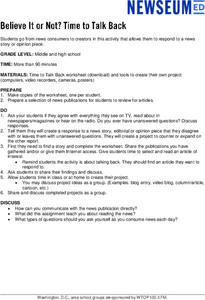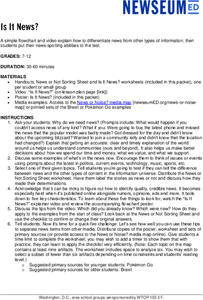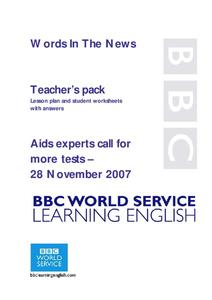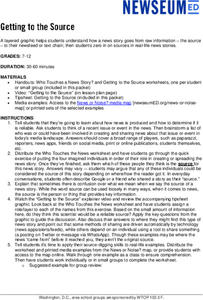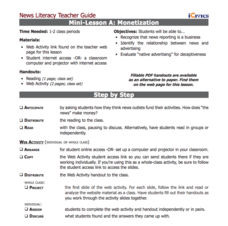Newseum
Free Press Challenges Through History: Analyzing Historical Sources
The debate over the integrity of stories in media is not new. Young journalists analyze historical sources that reveal freedom of the press controversies and draw parallels to challenges freedom of the press faces today.
Newseum
Reporting Part I: What Matters to Me
Young reporters have an opportunity to craft a news story about a topic that interests them. Class members brainstorm events and issues that affect them and possible sources of information. Individuals then select a topic, research it,...
Newseum
Believe It or Not? Time to Talk Back
Young journalists select a news story, editorial, or opinion piece that they disagree with or one that leaves them with questions. They then create their report in response and share it with the class.
Curated OER
Macbeth News Broadcast
Here is an authentic assessment task for Shakespeare's Macbeth. Young literature scholars prepare, perform, and record a news broadcast about the major events in the play. For example, groups may choose to report on the death of Lady...
Newseum
When Tragedy Hits — Role-Playing a Breaking News Story
Young journalists engage in a role-playing exercise that asks them to consider the journalism and ethical issues raised by the coverage of the mass shootings at Virginia Tech on April 16, 2007. Pupils play the role of either a reporter...
The New York Times
News and News Analysis: Navigating Fact and Opinion in the Times
Help your class understand the difference between fact and opinion by exploring the New York Times homepage and articles. In pairs or small groups, pupils complete a scavenger hunt, answering the provided questions. Next, discuss the...
Curated OER
Academic Achievement
Academic goals can lead high schoolers toward bright futures. Get your class to think about where they want to be in 20 years and what they'll need to do to get there with this lesson plan. Learners fill out a brief questionnaire about...
Curated OER
The Final Word
Although this lesson is based on “Final Word,” Craig Wilson’s USA Today column, the strategies could be adapted to any local columnist. After reading three articles independently, groups share observations about content and style used by...
University of Arizona
Found News Poems
Combine informational text and creative writing with one fun activity! Middle and high schoolers write found poems based on newspaper headlines that they find. The resource includes a thorough lesson plan and many links to articles that...
PBS
Broadcast News
Just because a story is on the news doesn't mean it's being presented fairly. Analyze news broadcasts with a lesson focused on evaluating television journalism. At home, kids watch a news show and note the stories presented, including...
Newseum
Is It News?
Is it news or not? That is the question young journalists must consider in a lesson about newsworthiness. Class members watch a short video that details five key characteristics of quality, credible news. Individuals then use these tips...
Newseum
Evidence: Do the Facts Hold Up?
Sometimes it's hard to escape bad information! Pupils learn the E.S.C.A.P.E. method for evaluating news sources and complete a worksheet to assess a news article using their new skills.
Newseum
Can I Trust the Creators?
It's easy to find information at the click of a mouse, but is it trustworthy? Pupils learn about the E.S.C.A.P.E. acronym for evaluating sources. Next, learners read a news story and evaluate its sources to determine credibility. Last,...
American Press Institute
Newspapers in Your Life: What’s News Where?
Big news isn't necessarily newsworthy everywhere! How do journalists decide what to cover with so much happening around them? A instructional activity on media literacy examines the factors that affect the media's choice of stories to...
Curated OER
Words in the News
Students observe and demonstrate how read and comprehend a short news report. They read an article about AIDS and HIV testing, define key vocabulary terms, and complete a skimming activity. Students then take a quiz and complete a...
Newseum
Media Ethics: Fairness Formula Starts With Accuracy
As part of a study of media ethics, young journalists apply a fairness formula to news reports. They look at accuracy, balance, completeness, detachment, and ethics to determine if the reporting is fair.
Deliberating in a Democracy
Free and Independent Press
Young scholars determine how free press principles can be compromised. For this global studies activity, students read an article titled "Free and Independent Press." Young scholars respond to discussion questions regarding the article.
Curated OER
Johannes Gutenberg and the Printing Press
Learners use library or online resources to create time lines on the life of Johannes Gutenberg and tell the impact his invention, the printing press, had on the development of newspapers.
Newseum
The Making of Fake News: A Case Study
"Fake News" (stories that are entirely fabricated/fictional) is the subject of a case study of the search for Jestin Coler, the creator of some of the most famous fake news stories. After reading NPR's investigative report, scholars...
Newseum
Covering a Catastrophe: Evaluating Disaster News
Young journalists investigate the various ways to share news about a disaster and evaluate the pros and cons of each of these types of news. Individuals then select two different forms of media reports of a recent disaster. Using the...
Newseum
Getting to the Source
Reliable news stories are based on facts from reliable sources. Young journalists learn how to evaluate the reliability of news sources by watching a short explainer video. Teams apply their new source-digging skills to a current news...
Newseum
Is It Fair?
Young journalists learn how to analyze word choice, context, and counterpoints to judge the fairness of a news story. They practice using these tools to judge a series of headlines for the story of Goldilocks and the Three Bears. They...
iCivics
Mini Lesson A: Monetization
Advertising is everywhere! Does your class know that their attention span is for sale, even when they're watching a simple news story? The second installment in a five-part series from iCivics examines the relationship between news...
The New York Times
Looking for Answers: Making Sense of the Boston Marathon Bombing
How should America respond to acts of domestic terrorism? What motivates or prompts a terrorist attack? After reading an opinion piece on the 2013 Boston Marathon bombing, your learners will critically analyze factors that could have...
Other popular searches
- Newspaper Article Writing
- Literature Newspaper Article
- Writing a Newspaper Article
- Newspaper Article Template
- Comprehending a News Article
- Main Idea of a News Article
- Environmental News Story
- Main Idea of a News Story
- Writing a News Article
- News Article Summary
- New York Times News Articles
- Analyzing News Articles




